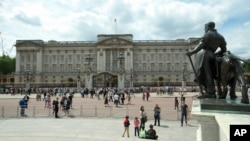Britons are divided as to whether their nation should join U.S.-led airstrikes against Islamic State in Syria. British lawmakers are expected to vote on the issue later this week.
Recent surveys show Europeans generally support more military action against IS; but, a sizable opposition exists in Britain, potentially making commitment to increased bombing more difficult for lawmakers.
Britain-based pollster YouGov says 59 percent of the British support airstrikes.
VOA surveyed 300 British citizens and found 44 percent of those questioned believe airstrikes targeting IS in Syria would be in their nation’s interest; 36 percent said they would not be. The remaining 20 percent were undecided.
Nearly all said the militant group poses a threat to their country, with half saying a military response is the best way to defeat it.
Two out of every five people who said bombing IS in Syria was not in Britain’s interest, also said IS could only be defeated by using some military force.
A student from Manchester, Samson Hart, says he is worried a military approach could eventually backfire on Britain and its allies.
“We have to think about what us bombing Syria will add to the current process that is already going on there; probably not much. It’s probably more of a statement of power and intent against IS. And it does not really work; they feed off that. So it might cause a bigger threat to us than already exists," said Hart.
Similar thoughts were voiced by thousands of anti-airstrike protesters in Spain and Britain on Saturday. In London, roughly 4,000 people protested in front of the prime minister’s residence at No. 10 Downing Street.
A civil servant from Birmingham, Anthony Patrick, was in London at the time, but did not take part.
“I do not want to see the UK bombing any country; but, you cannot negotiate with people who are willing to blow themselves up. Their agenda is not something that can be agreed to politically or over a conference table, so you got to fight fire with fire sometimes," said Patrick.
Britain has been bombing IS targets in Iraq since late last year, but the group’s headquarters is in Raqqa, Syria. Highlighting the recent attacks in Paris, Prime Minister David Cameron last week told parliamentarians that extending British bombing to Syria is in the world’s interest.
“Let us be frank, this attack could just as well have been in London as it was in Paris and we should recognize what a close alliance we have with France, what a close alliance we have with the United States, and how together we can make our world safer," said Cameron.
John Bew is a senior research fellow at the War Studies Department of King's College London. He says that while increased airstrikes in Syria will significantly damage aspects of the IS regime, they are unlikely to defeat the group.
“It is very hard to defeat IS entirely militarily without troops on the ground," said Bew.
Britain and its Western allies have ruled out deploying ground troops.
Bew points out that ultimately the decision to engage in Syrian airstrikes is in the hands of parliament.
“The real leadership cannot come from following opinion polls; it comes from those who are elected to be responsible for British national security," he said.
Cameron says he will only have the House of Commons vote if he is confident of winning.
